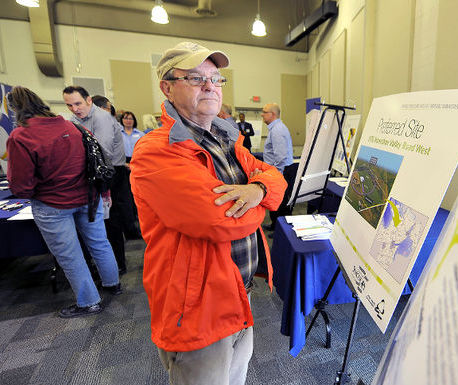Residents not keen on waste site

By Ian McInroy, Barrie Examiner
Residents opposed to Simcoe County’s proposed organics processing and materials management facilities took their cause to public information sessions on Tuesday.
The meetings were held at the Simcoe County Museum in Midhurst and provided residents and stakeholders with an update on the projects.
The facilities would be located at 2976 Horseshoe Valley Rd. W. in Springwater Township, east of County Road 27, a site approved by county councillors last month.
During the two information sessions — held in the afternoon and the evening — county staff were on hand to provide an overview of the projects, details about why the Horseshoe Valley site was chosen and the next steps in the project’s timeline.
Rob McCullough, the county’s director of solid waste management, said more than 500 potential sites were considered for the facilities before the Horseshoe Valley Road location was deemed to be the most appropriate.
But residents living near the site, including many who are members of Reject Our Agricultural Rezoning (ROAR), are dead set against the proposal, according to group spokesman John Spencer.
He’s one of the group members, who have dubbed themselves the ‘500-metre club’, who live within a half-kilometre of the 11-acre site located within a 207-acre tract of Simcoe County forest.
Spencer cites concerns about increased traffic, mismanagement of the forest, possible environmental concerns and “unknown/unproven” technology for the organics processing aspect of the facilities.
“They (the county) talk about the technology offsetting any pollution problems. But there will be numerous trips of garbage trucks going in and out of the forest every day,” he said. “Those trucks on Horseshoe Valley Road will be mingling with all the tourists who go skiing, hiking or are on their way to the cottage.
“We think it will be a disgusting sight and one stinking solution,” Spencer added, alluding to the county’s ‘Get the Facts’ brochure last month entitled ‘One Site, One Solution’.
But much work and public consultation has yet to be done, McCullough said, adding deciding upon which organics processing technology will be used is critical.
“There are such a huge variety of technologies that have been proven. To nail it down, we’ve got to look a number of different factors and cost being one of them,” he said. “There’s traditional composting, but what’s been becoming more commonplace now is anaerobic digestion.”
Anaerobic digestion is a series of biological processes in which micro-organisms break down biodegradable material in the absence of oxygen. One of the end products is bio-gas, which is combusted to generate electricity and heat, or can be processed into renewable natural gas and transportation fuels.
“The microbes that work produce methane gas, so then you have to come up with a valuable use for the methane gas,” McCullough said. “Potentially, you can look at those energy savings. You can go forward in the future and actually sell that. You can sell it as electricity. You can clean it up to pipeline-quality.
“But you never know until you’ve run a full purchasing process to determine, in your particular set of circumstances, which is going to do the best job for you,” he added. “It looks at capital costs, but you also have to look at operating costs going forward and then revenue streams that could be coming in.”
McCullough said a number of initial studies need to be done before the facilities can move forward.
“We’re trying not to put the cart before the horse,” he said, adding environmental and traffic impact studies will be required before the site is deemed to be usable for any one of those technologies.
“We haven’t put any holes in the ground to confirm site conditions. That’s what we’re doing now, to confirm site conditions,” McCullough added. “If it turns out the site isn’t everything we think it is, then we’ll have to rethink our steps and decide where to go. But there is every indication that the site is going to prove as good for the purpose a we believe it is.
“Because we haven’t decided on the technology for the organics processing at this point, we haven’t been able to present council with a business case,” McCullough said. “But that will come in time. We are absolutely building towards that business case. But there are a number of things we have to do first.
“For instance, we have to put geo-technicals in the ground to determine the foundation’s cost, things like that, which go into the cost of the buildings. Those things are being done at this stage and we’ll get through the technology selection and the costing of it, and that will come back to county council.”
The organics processing industry is regulated “very closely” by the Ministry of Environment and Climate Change to have no offsite odour impacts.
“There are very strict guidelines,” McCullough added.









Leave a Reply